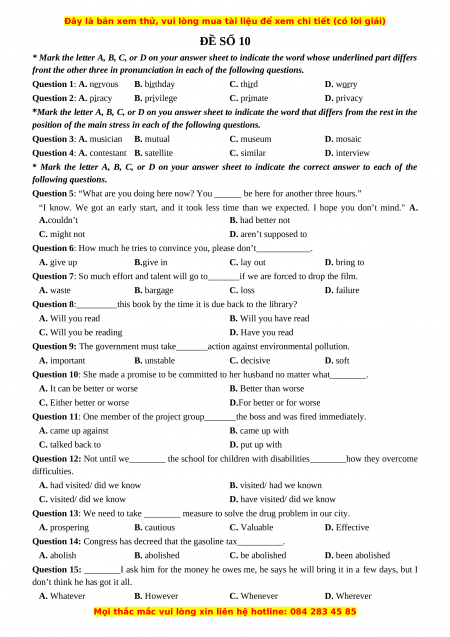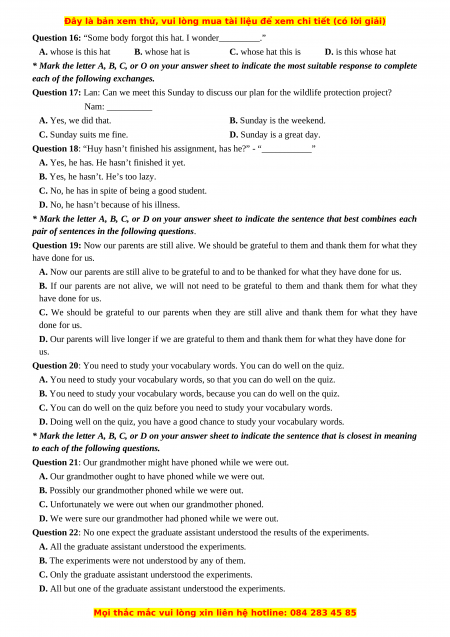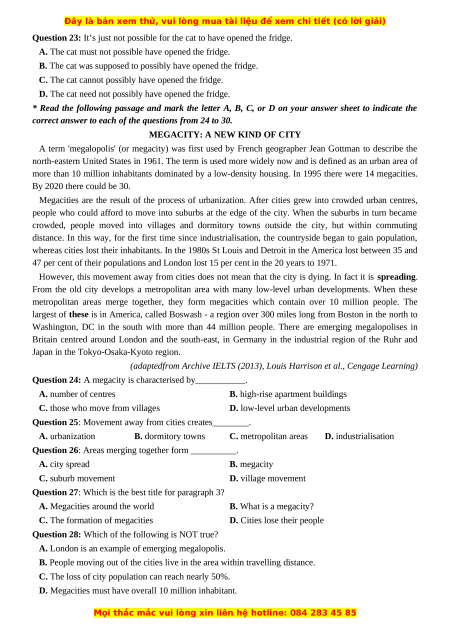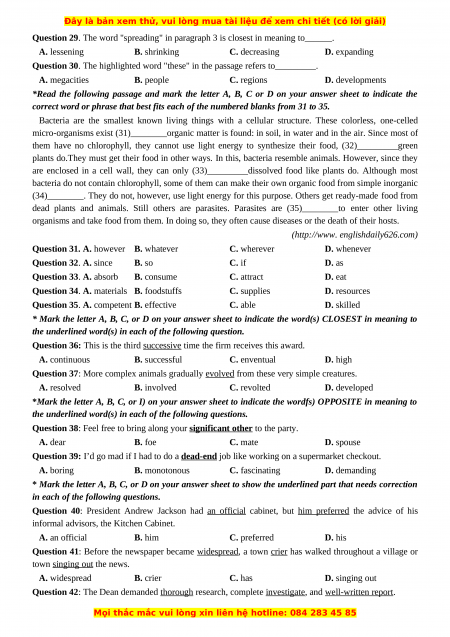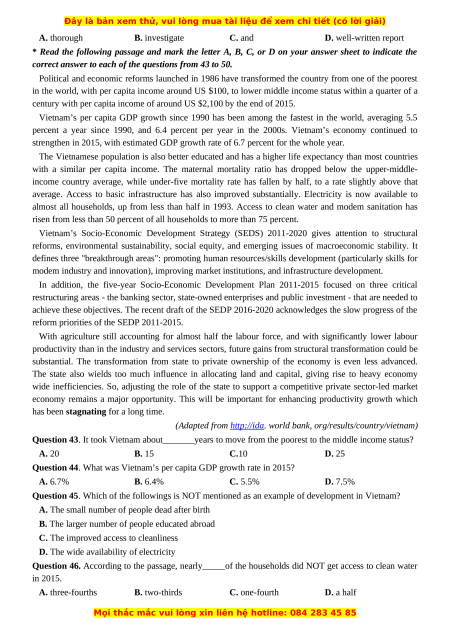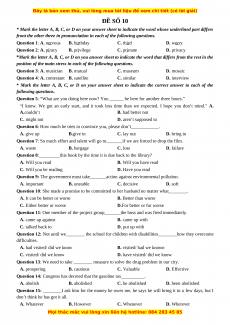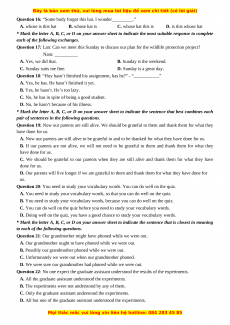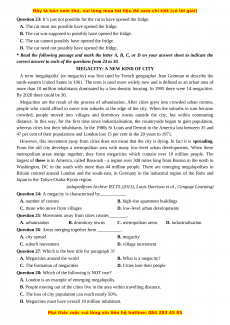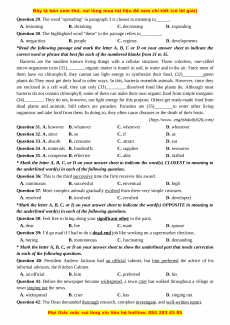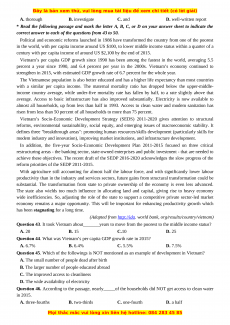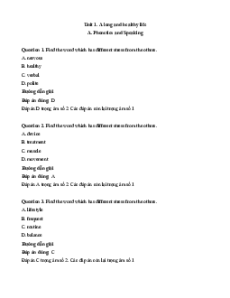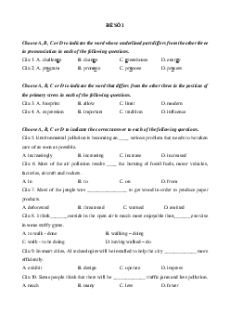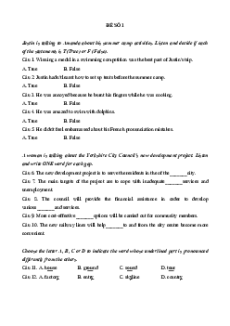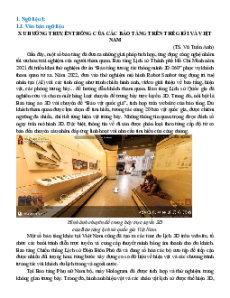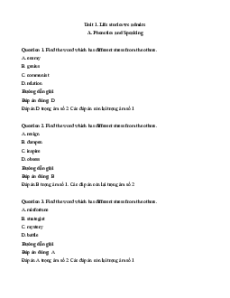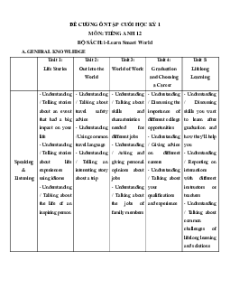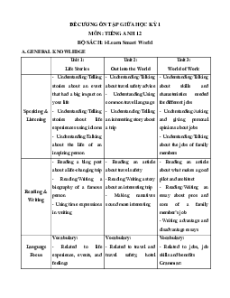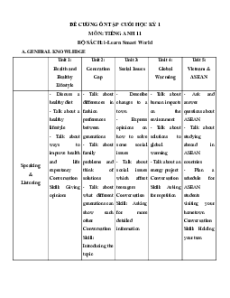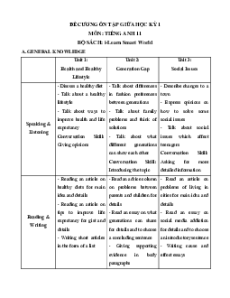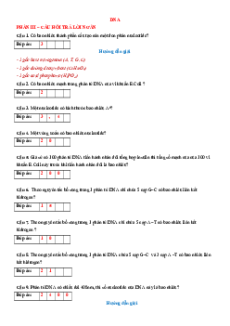ĐỀ SỐ 10
* Mark the letter A, B, C, or D on your answer sheet to indicate the word whose underlined part differs
front the other three in pronunciation in each of the following questions.
Question 1: A. nervous B. birthday C. third D. worry
Question 2: A. piracy B. privilege C. primate D. privacy
*Mark the letter A, B, C, or D on you answer sheet to indicate the word that differs from the rest in the
position of the main stress in each of the following questions.
Question 3: A. musician B. mutual C. museum D. mosaic
Question 4: A. contestant B. satellite C. similar D. interview
* Mark the letter A, B, C, or D on your answer sheet to indicate the correct answer to each of the following questions.
Question 5: “What are you doing here now? You ______ be here for another three hours.”
“I know. We got an early start, and it took less time than we expected. I hope you don’t mind." A. A.couldn’t B. had better not C. might not D. aren’t supposed to
Question 6: How much he tries to convince you, please don’t____________. A. give up B.give in C. lay out D. bring to
Question 7: So much effort and talent will go to_______if we are forced to drop the film. A. waste B. bargage C. loss D. failure
Question 8:_________this book by the time it is due back to the library? A. Will you read B. Will you have read C. Will you be reading D. Have you read
Question 9: The government must take_______action against environmental pollution. A. important B. unstable C. decisive D. soft
Question 10: She made a promise to be committed to her husband no matter what________.
A. It can be better or worse B. Better than worse
C. Either better or worse
D.For better or for worse
Question 11: One member of the project group_______the boss and was fired immediately. A. came up against B. came up with C. talked back to D. put up with
Question 12: Not until we________ the school for children with disabilities________how they overcome difficulties.
A. had visited/ did we know
B. visited/ had we known C. visited/ did we know
D. have visited/ did we know
Question 13: We need to take ________ measure to solve the drug problem in our city. A. prospering B. cautious C. Valuable D. Effective
Question 14: Congress has decreed that the gasoline tax__________. A. abolish B. abolished C. be abolished D. been abolished
Question 15: ________I ask him for the money he owes me, he says he will bring it in a few days, but I
don’t think he has got it all. A. Whatever B. However C. Whenever D. Wherever
Question 16: “Some body forgot this hat. I wonder_________.” A. whose is this hat B. whose hat is C. whose hat this is D. is this whose hat
* Mark the letter A, B, C, or O on your answer sheet to indicate the most suitable response to complete
each of the following exchanges.
Question 17: Lan: Can we meet this Sunday to discuss our plan for the wildlife protection project? Nam: __________ A. Yes, we did that.
B. Sunday is the weekend.
C. Sunday suits me fine.
D. Sunday is a great day.
Question 18: “Huy hasn’t finished his assignment, has he?” - “___________”
A. Yes, he has. He hasn’t finished it yet.
B. Yes, he hasn’t. He’s too lazy.
C. No, he has in spite of being a good student.
D. No, he hasn’t because of his illness.
* Mark the letter A, B, C, or D on your answer sheet to indicate the sentence that best combines each
pair of sentences in the following questions.
Question 19: Now our parents are still alive. We should be grateful to them and thank them for what they have done for us.
A. Now our parents are still alive to be grateful to and to be thanked for what they have done for us.
B. If our parents are not alive, we will not need to be grateful to them and thank them for what they have done for us.
C. We should be grateful to our parents when they are still alive and thank them for what they have done for us.
D. Our parents will live longer if we are grateful to them and thank them for what they have done for us.
Question 20: You need to study your vocabulary words. You can do well on the quiz.
A. You need to study your vocabulary words, so that you can do well on the quiz.
B. You need to study your vocabulary words, because you can do well on the quiz.
C. You can do well on the quiz before you need to study your vocabulary words.
D. Doing well on the quiz, you have a good chance to study your vocabulary words.
* Mark the letter A, B, C, or D on your answer sheet to indicate the sentence that is closest in meaning
to each of the following questions.
Question 21: Our grandmother might have phoned while we were out.
A. Our grandmother ought to have phoned while we were out.
B. Possibly our grandmother phoned while we were out.
C. Unfortunately we were out when our grandmother phoned.
D. We were sure our grandmother had phoned while we were out.
Question 22: No one expect the graduate assistant understood the results of the experiments.
A. All the graduate assistant understood the experiments.
B. The experiments were not understood by any of them.
C. Only the graduate assistant understood the experiments.
D. All but one of the graduate assistant understood the experiments.
Question 23: It’s just not possible for the cat to have opened the fridge.
A. The cat must not possible have opened the fridge.
B. The cat was supposed to possibly have opened the fridge.
C. The cat cannot possibly have opened the fridge.
D. The cat need not possibly have opened the fridge.
* Read the following passage and mark the letter A, B, C, or D on your answer sheet to indicate the
correct answer to each of the questions from 24 to 30.
MEGACITY: A NEW KIND OF CITY
A term 'megalopolis' (or megacity) was first used by French geographer Jean Gottman to describe the
north-eastern United States in 1961. The term is used more widely now and is defined as an urban area of
more than 10 million inhabitants dominated by a low-density housing. In 1995 there were 14 megacities. By 2020 there could be 30.
Megacities are the result of the process of urbanization. After cities grew into crowded urban centres,
people who could afford to move into suburbs at the edge of the city. When the suburbs in turn became
crowded, people moved into villages and dormitory towns outside the city, but within commuting
distance. In this way, for the first time since industrialisation, the countryside began to gain population,
whereas cities lost their inhabitants. In the 1980s St Louis and Detroit in the America lost between 35 and
47 per cent of their populations and London lost 15 per cent in the 20 years to 1971.
However, this movement away from cities does not mean that the city is dying. In fact it is spreading.
From the old city develops a metropolitan area with many low-level urban developments. When these
metropolitan areas merge together, they form megacities which contain over 10 million people. The
largest of these is in America, called Boswash - a region over 300 miles long from Boston in the north to
Washington, DC in the south with more than 44 million people. There are emerging megalopolises in
Britain centred around London and the south-east, in Germany in the industrial region of the Ruhr and
Japan in the Tokyo-Osaka-Kyoto region.
(adaptedfrom Archive IELTS (2013), Louis Harrison et al., Cengage Learning)
Question 24: A megacity is characterised by___________. A. number of centres
B. high-rise apartment buildings
C. those who move from villages
D. low-level urban developments
Question 25: Movement away from cities creates________. A. urbanization B. dormitory towns C. metropolitan areas D. industrialisation
Question 26: Areas merging together form __________. A. city spread B. megacity C. suburb movement D. village movement
Question 27: Which is the best title for paragraph 3?
A. Megacities around the world B. What is a megacity?
C. The formation of megacities
D. Cities lose their people
Question 28: Which of the following is NOT true?
A. London is an example of emerging megalopolis.
B. People moving out of the cities live in the area within travelling distance.
C. The loss of city population can reach nearly 50%.
D. Megacities must have overall 10 million inhabitant.
Question 29. The word "spreading" in paragraph 3 is closest in meaning to______. A. lessening B. shrinking C. decreasing D. expanding
Question 30. The highlighted word "these" in the passage refers to_________. A. megacities B. people C. regions D. developments
*Read the following passage and mark the letter A, B, C or D on your answer sheet to indicate the
correct word or phrase that best fits each of the numbered blanks from 31 to 35.
Bacteria are the smallest known living things with a cellular structure. These colorless, one-celled
micro-organisms exist (31)________organic matter is found: in soil, in water and in the air. Since most of
them have no chlorophyll, they cannot use light energy to synthesize their food, (32)_________green
plants do.They must get their food in other ways. In this, bacteria resemble animals. However, since they
are enclosed in a cell wall, they can only (33)_________dissolved food like plants do. Although most
bacteria do not contain chlorophyll, some of them can make their own organic food from simple inorganic
(34)________. They do not, however, use light energy for this purpose. Others get ready-made food from
dead plants and animals. Still others are parasites. Parasites are (35)________to enter other living
organisms and take food from them. In doing so, they often cause diseases or the death of their hosts.
(http://www. englishdaily626.com)
Question 31. A. however B. whatever C. wherever D. whenever
Question 32. A. since B. so C. if D. as
Question 33. A. absorb B. consume C. attract D. eat
Question 34. A. materials B. foodstuffs C. supplies D. resources
Question 35. A. competent B. effective C. able D. skilled
* Mark the letter A, B, C, or D on your answer sheet to indicate the word(s) CLOSEST in meaning to
the underlined word(s) in each of the following question.
Question 36: This is the third successive time the firm receives this award. A. continuous B. successful C. enventual D. high
Question 37: More complex animals gradually evolved from these very simple creatures. A. resolved B. involved C. revolted D. developed
*Mark the letter A, B, C, or I) on your answer sheet to indicate the wordfs) OPPOSITE in meaning to
the underlined word(s) in each of the following questions.
Question 38: Feel free to bring along your significant other to the party. A. dear B. foe C. mate D. spouse
Question 39: I’d go mad if I had to do a dead-end job like working on a supermarket checkout. A. boring B. monotonous C. fascinating D. demanding
* Mark the letter A, B, C, or D on your answer sheet to show the underlined part that needs correction
in each of the following questions.
Question 40: President Andrew Jackson had an official cabinet, but him preferred the advice of his
informal advisors, the Kitchen Cabinet. A. an official B. him C. preferred D. his
Question 41: Before the newspaper became widespread, a town crier has walked throughout a village or town singing out the news. A. widespread B. crier C. has D. singing out
Question 42: The Dean demanded thorough research, complete investigate, and well-written report.
Đề thi thử THPT Quốc Gia môn Tiếng Anh có đáp án ( đề 10 ) - thầy Bùi Văn Vinh
389
195 lượt tải
MUA NGAY ĐỂ XEM TOÀN BỘ TÀI LIỆU
CÁCH MUA:
- B1: Gửi phí vào TK:
1133836868- CT TNHH DAU TU VA DV GD VIETJACK - Ngân hàng MB (QR) - B2: Nhắn tin tới Zalo VietJack Official ( nhấn vào đây ) để xác nhận thanh toán và tải tài liệu - giáo án
Liên hệ ngay Hotline hỗ trợ: 084 283 45 85
Đề thi được cập nhật liên tục trong gói này từ nay đến hết tháng 6/2023. Chúng tôi đảm bảo đủ số lượng đề đã cam kết hoặc có thể nhiều hơn, tất cả có BẢN WORD, LỜI GIẢI CHI TIẾT và tải về dễ dàng.
Để tải tài liệu gốc về máy bạn click vào nút Tải Xuống ở trên!
Thuộc bộ (mua theo bộ để tiết kiệm hơn):
- Các đề thi được chọn lọc từ các trường Chuyên và Sở Giáo dục cả nước. Đảm bảo chất lượng, cấu trúc bám sát nhất với kì thì TN THPT 2023 môn Tiếng Anh.
- File word có lời giải chi tiết 100%.
- Đề thi mới sẽ được cập nhật tại gói này đến sát kì thi TN THPT 2023
- Mua trọn bộ sẽ tiết kiệm hơn tải lẻ 50%.
Đánh giá
4.6 / 5(389 )5
4
3
2
1
Trọng Bình
Tài liệu hay
Giúp ích cho tôi rất nhiều
Duy Trần
Tài liệu chuẩn
Rất thích tài liệu bên VJ soạn (bám sát chương trình dạy)
TÀI LIỆU BỘ BÁN CHẠY MÔN Tiếng Anh
Xem thêmTÀI LIỆU BỘ BÁN CHẠY Lớp 12
Xem thêmTài liệu bộ mới nhất

Đây là bản xem thử, vui lòng mua tài liệu để xem chi tiết (có lời giải)
ĐỀ SỐ 10
* Mark the letter A, B, C, or D on your answer sheet to indicate the word whose underlined part differs
front the other three in pronunciation in each of the following questions.
Question 1: A. nervous B. birthday C. third D. worry
Question 2: A. piracy B. privilege C. primate D. privacy
*Mark the letter A, B, C, or D on you answer sheet to indicate the word that differs from the rest in the
position of the main stress in each of the following questions.
Question 3: A. musician B. mutual C. museum D. mosaic
Question 4: A. contestant B. satellite C. similar D. interview
* Mark the letter A, B, C, or D on your answer sheet to indicate the correct answer to each of the
following questions.
Question 5: “What are you doing here now? You ______ be here for another three hours.”
“I know. We got an early start, and it took less time than we expected. I hope you don’t mind." A.
A.couldn’t B. had better not
C. might not D. aren’t supposed to
Question 6: How much he tries to convince you, please don’t____________.
A. give up B.give in C. lay out D. bring to
Question 7: So much effort and talent will go to_______if we are forced to drop the film.
A. waste B. bargage C. loss D. failure
Question 8:_________this book by the time it is due back to the library?
A. Will you read B. Will you have read
C. Will you be reading D. Have you read
Question 9: The government must take_______action against environmental pollution.
A. important B. unstable C. decisive D. soft
Question 10: She made a promise to be committed to her husband no matter what________.
A. It can be better or worse B. Better than worse
C. Either better or worse D.For better or for worse
Question 11: One member of the project group_______the boss and was fired immediately.
A. came up against B. came up with
C. talked back to D. put up with
Question 12: Not until we________ the school for children with disabilities________how they overcome
difficulties.
A. had visited/ did we know B. visited/ had we known
C. visited/ did we know D. have visited/ did we know
Question 13: We need to take ________ measure to solve the drug problem in our city.
A. prospering B. cautious C. Valuable D. Effective
Question 14: Congress has decreed that the gasoline tax__________.
A. abolish B. abolished C. be abolished D. been abolished
Question 15: ________I ask him for the money he owes me, he says he will bring it in a few days, but I
don’t think he has got it all.
A. Whatever B. However C. Whenever D. Wherever
Mọi thắc mắc vui lòng xin liên hệ hotline: 084 283 45 85

Đây là bản xem thử, vui lòng mua tài liệu để xem chi tiết (có lời giải)
Question 16: “Some body forgot this hat. I wonder_________.”
A. whose is this hat B. whose hat is C. whose hat this is D. is this whose hat
* Mark the letter A, B, C, or O on your answer sheet to indicate the most suitable response to complete
each of the following exchanges.
Question 17: Lan: Can we meet this Sunday to discuss our plan for the wildlife protection project?
Nam: __________
A. Yes, we did that. B. Sunday is the weekend.
C. Sunday suits me fine. D. Sunday is a great day.
Question 18: “Huy hasn’t finished his assignment, has he?” - “___________”
A. Yes, he has. He hasn’t finished it yet.
B. Yes, he hasn’t. He’s too lazy.
C. No, he has in spite of being a good student.
D. No, he hasn’t because of his illness.
* Mark the letter A, B, C, or D on your answer sheet to indicate the sentence that best combines each
pair of sentences in the following questions.
Question 19: Now our parents are still alive. We should be grateful to them and thank them for what they
have done for us.
A. Now our parents are still alive to be grateful to and to be thanked for what they have done for us.
B. If our parents are not alive, we will not need to be grateful to them and thank them for what they
have done for us.
C. We should be grateful to our parents when they are still alive and thank them for what they have
done for us.
D. Our parents will live longer if we are grateful to them and thank them for what they have done for
us.
Question 20: You need to study your vocabulary words. You can do well on the quiz.
A. You need to study your vocabulary words, so that you can do well on the quiz.
B. You need to study your vocabulary words, because you can do well on the quiz.
C. You can do well on the quiz before you need to study your vocabulary words.
D. Doing well on the quiz, you have a good chance to study your vocabulary words.
* Mark the letter A, B, C, or D on your answer sheet to indicate the sentence that is closest in meaning
to each of the following questions.
Question 21: Our grandmother might have phoned while we were out.
A. Our grandmother ought to have phoned while we were out.
B. Possibly our grandmother phoned while we were out.
C. Unfortunately we were out when our grandmother phoned.
D. We were sure our grandmother had phoned while we were out.
Question 22: No one expect the graduate assistant understood the results of the experiments.
A. All the graduate assistant understood the experiments.
B. The experiments were not understood by any of them.
C. Only the graduate assistant understood the experiments.
D. All but one of the graduate assistant understood the experiments.
Mọi thắc mắc vui lòng xin liên hệ hotline: 084 283 45 85

Đây là bản xem thử, vui lòng mua tài liệu để xem chi tiết (có lời giải)
Question 23: It’s just not possible for the cat to have opened the fridge.
A. The cat must not possible have opened the fridge.
B. The cat was supposed to possibly have opened the fridge.
C. The cat cannot possibly have opened the fridge.
D. The cat need not possibly have opened the fridge.
* Read the following passage and mark the letter A, B, C, or D on your answer sheet to indicate the
correct answer to each of the questions from 24 to 30.
MEGACITY: A NEW KIND OF CITY
A term 'megalopolis' (or megacity) was first used by French geographer Jean Gottman to describe the
north-eastern United States in 1961. The term is used more widely now and is defined as an urban area of
more than 10 million inhabitants dominated by a low-density housing. In 1995 there were 14 megacities.
By 2020 there could be 30.
Megacities are the result of the process of urbanization. After cities grew into crowded urban centres,
people who could afford to move into suburbs at the edge of the city. When the suburbs in turn became
crowded, people moved into villages and dormitory towns outside the city, but within commuting
distance. In this way, for the first time since industrialisation, the countryside began to gain population,
whereas cities lost their inhabitants. In the 1980s St Louis and Detroit in the America lost between 35 and
47 per cent of their populations and London lost 15 per cent in the 20 years to 1971.
However, this movement away from cities does not mean that the city is dying. In fact it is spreading.
From the old city develops a metropolitan area with many low-level urban developments. When these
metropolitan areas merge together, they form megacities which contain over 10 million people. The
largest of these is in America, called Boswash - a region over 300 miles long from Boston in the north to
Washington, DC in the south with more than 44 million people. There are emerging megalopolises in
Britain centred around London and the south-east, in Germany in the industrial region of the Ruhr and
Japan in the Tokyo-Osaka-Kyoto region.
(adaptedfrom Archive IELTS (2013), Louis Harrison et al., Cengage Learning)
Question 24: A megacity is characterised by___________.
A. number of centres B. high-rise apartment buildings
C. those who move from villages D. low-level urban developments
Question 25: Movement away from cities creates________.
A. urbanization B. dormitory towns C. metropolitan areas D. industrialisation
Question 26: Areas merging together form __________.
A. city spread B. megacity
C. suburb movement D. village movement
Question 27: Which is the best title for paragraph 3?
A. Megacities around the world B. What is a megacity?
C. The formation of megacities D. Cities lose their people
Question 28: Which of the following is NOT true?
A. London is an example of emerging megalopolis.
B. People moving out of the cities live in the area within travelling distance.
C. The loss of city population can reach nearly 50%.
D. Megacities must have overall 10 million inhabitant.
Mọi thắc mắc vui lòng xin liên hệ hotline: 084 283 45 85

Đây là bản xem thử, vui lòng mua tài liệu để xem chi tiết (có lời giải)
Question 29. The word "spreading" in paragraph 3 is closest in meaning to______.
A. lessening B. shrinking C. decreasing D. expanding
Question 30. The highlighted word "these" in the passage refers to_________.
A. megacities B. people C. regions D. developments
*Read the following passage and mark the letter A, B, C or D on your answer sheet to indicate the
correct word or phrase that best fits each of the numbered blanks from 31 to 35.
Bacteria are the smallest known living things with a cellular structure. These colorless, one-celled
micro-organisms exist (31)________organic matter is found: in soil, in water and in the air. Since most of
them have no chlorophyll, they cannot use light energy to synthesize their food, (32)_________green
plants do.They must get their food in other ways. In this, bacteria resemble animals. However, since they
are enclosed in a cell wall, they can only (33)_________dissolved food like plants do. Although most
bacteria do not contain chlorophyll, some of them can make their own organic food from simple inorganic
(34)________. They do not, however, use light energy for this purpose. Others get ready-made food from
dead plants and animals. Still others are parasites. Parasites are (35)________to enter other living
organisms and take food from them. In doing so, they often cause diseases or the death of their hosts.
(http://www. englishdaily626.com)
Question 31. A. however B. whatever C. wherever D. whenever
Question 32. A. since B. so C. if D. as
Question 33. A. absorb B. consume C. attract D. eat
Question 34. A. materials B. foodstuffs C. supplies D. resources
Question 35. A. competent B. effective C. able D. skilled
* Mark the letter A, B, C, or D on your answer sheet to indicate the word(s) CLOSEST in meaning to
the underlined word(s) in each of the following question.
Question 36: This is the third successive time the firm receives this award.
A. continuous B. successful C. enventual D. high
Question 37: More complex animals gradually evolved from these very simple creatures.
A. resolved B. involved C. revolted D. developed
*Mark the letter A, B, C, or I) on your answer sheet to indicate the wordfs) OPPOSITE in meaning to
the underlined word(s) in each of the following questions.
Question 38: Feel free to bring along your significant other to the party.
A. dear B. foe C. mate D. spouse
Question 39: I’d go mad if I had to do a dead-end job like working on a supermarket checkout.
A. boring B. monotonous C. fascinating D. demanding
* Mark the letter A, B, C, or D on your answer sheet to show the underlined part that needs correction
in each of the following questions.
Question 40: President Andrew Jackson had an official cabinet, but him preferred the advice of his
informal advisors, the Kitchen Cabinet.
A. an official B. him C. preferred D. his
Question 41: Before the newspaper became widespread, a town crier has walked throughout a village or
town singing out the news.
A. widespread B. crier C. has D. singing out
Question 42: The Dean demanded thorough research, complete investigate, and well-written report.
Mọi thắc mắc vui lòng xin liên hệ hotline: 084 283 45 85

Đây là bản xem thử, vui lòng mua tài liệu để xem chi tiết (có lời giải)
A. thorough B. investigate C. and D. well-written report
* Read the following passage and mark the letter A, B, C, or D on your answer sheet to indicate the
correct answer to each of the questions from 43 to 50.
Political and economic reforms launched in 1986 have transformed the country from one of the poorest
in the world, with per capita income around US $100, to lower middle income status within a quarter of a
century with per capita income of around US $2,100 by the end of 2015.
Vietnam’s per capita GDP growth since 1990 has been among the fastest in the world, averaging 5.5
percent a year since 1990, and 6.4 percent per year in the 2000s. Vietnam’s economy continued to
strengthen in 2015, with estimated GDP growth rate of 6.7 percent for the whole year.
The Vietnamese population is also better educated and has a higher life expectancy than most countries
with a similar per capita income. The maternal mortality ratio has dropped below the upper-middle-
income country average, while under-five mortality rate has fallen by half, to a rate slightly above that
average. Access to basic infrastructure has also improved substantially. Electricity is now available to
almost all households, up from less than half in 1993. Access to clean water and modem sanitation has
risen from less than 50 percent of all households to more than 75 percent.
Vietnam’s Socio-Economic Development Strategy (SEDS) 2011-2020 gives attention to structural
reforms, environmental sustainability, social equity, and emerging issues of macroeconomic stability. It
defines three "breakthrough areas": promoting human resources/skills development (particularly skills for
modem industry and innovation), improving market institutions, and infrastructure development.
In addition, the five-year Socio-Economic Development Plan 2011-2015 focused on three critical
restructuring areas - the banking sector, state-owned enterprises and public investment - that are needed to
achieve these objectives. The recent draft of the SEDP 2016-2020 acknowledges the slow progress of the
reform priorities of the SEDP 2011-2015.
With agriculture still accounting for almost half the labour force, and with significantly lower labour
productivity than in the industry and services sectors, future gains from structural transformation could be
substantial. The transformation from state to private ownership of the economy is even less advanced.
The state also wields too much influence in allocating land and capital, giving rise to heavy economy
wide inefficiencies. So, adjusting the role of the state to support a competitive private sector-led market
economy remains a major opportunity. This will be important for enhancing productivity growth which
has been stagnating for a long time.
(Adapted from http://ida. world bank, org/results/country/vietnam)
Question 43. It took Vietnam about_______years to move from the poorest to the middle income status?
A. 20 B. 15 C.10 D. 25
Question 44. What was Vietnam’s per capita GDP growth rate in 2015?
A. 6.7% B. 6.4% C. 5.5% D. 7.5%
Question 45. Which of the followings is NOT mentioned as an example of development in Vietnam?
A. The small number of people dead after birth
B. The larger number of people educated abroad
C. The improved access to cleanliness
D. The wide availability of electricity
Question 46. According to the passage, nearly_____of the households did NOT get access to clean water
in 2015.
A. three-fourths B. two-thirds C. one-fourth D. a half
Mọi thắc mắc vui lòng xin liên hệ hotline: 084 283 45 85
